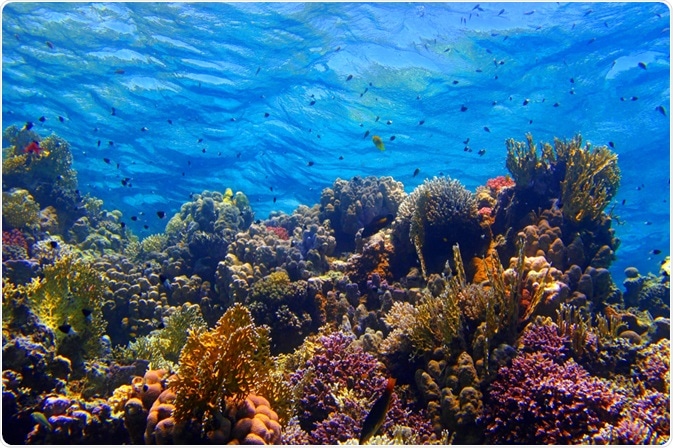As the global population continues to grow, many emerging issues are challenging human development around the world. Specifically, issues relating to food production are considered a key issue to overcome in a rapidly changing world.

Marine Ecosystem. Image Credit: blue-sea.cz/Shutterstock.com
However, the advent of global climate change is threatening the food production necessary for burgeoning human populations.
Marine Ecosystems
In terrestrial systems, global climate change is recognized to impact many aspects of human lives from reducing food quality and quantity to increasing the propensity in developing cardiovascular issues. However, global change is also occurring in marine environments.
Marine ecosystems provide a range of resources and services for human societies, yet they are negatively impacted by global change, and particularly the acidification of the oceans. That is oceans around the world acting as a major carbon sink, absorbing considerable amounts of carbon dioxide, which has led to changes in water chemistry, specifically a reduction in ocean pH and calcium carbonate. Such drastic changes are affecting marine ecosystems and the species within them, negatively impacting food provisioning and ultimately impacting human wellbeing.
Previous research has demonstrated that ocean acidification is directly affecting human wellbeing by reducing the availability and quality of many marine resources. For instance, the survival and reproduction of many commercially important species, from fish to mollusks and crustaceans, is recognized to decline with ocean acidification. However, ocean acidification also generates many indirect impacts for human populations, which are derived from a reduction in food quality and quantity.
Impacts of Ocean Acidification
A new synthesis by Prof. Laura Falkenberg and colleagues has revealed the myriad of impacts generated by ocean acidification by affecting resource availability. In particular, researchers focused on the effects of ocean acidification relating to (1) malnutrition and poisoning, (2) respiratory issues, (3) mental health impacts, and (4) development of medical resources. By assembling literature on these various impacts, this synthesis demonstrated that human wellbeing is not only affected by the socioeconomic losses attributed to ocean acidification but also through several more complex and indirect impacts.
Firstly, this synthesis revealed that ocean acidification increases the propensity for malnutrition in human populations primarily due to a reduction in nutritional quality and an increase in toxicity in the food consumed. Secondly, the increase in frequency and severity of algal blooms also worsens the air quality leading to respiratory issues for coastal populations. Thirdly, as a consequence of habitat degradation and the loss of species, ocean acidification will also worsen.
More specifically, losing natural spaces as well as economic opportunities will negatively affect populations along coastlines as well as communities that rely on such resources. Fourthly, the loss of key ecosystem services and degradation of habitats in marine environments will diminish the capacity to discover new medicinal treatments or improve existing ones. Potential marine-derived medicinal properties are being lost even before discovering them, hindering future prospects to develop new treatments.
Following the discussion of the various impacts, the synthesis presented the use of various strategies to mitigate the effects of ocean acidification on human wellbeing by protecting marine resources. Indeed, strategies rely primarily on the conservation and management of habitats and resources as well as the adaptation of human activities to reduce the overexploitation and degradation of marine resources.
On the other hand, these strategies depend on societal, economic, and political interest in preserving marine systems, which can be difficult in highly urbanized and rapidly developing areas. Moreover, the interaction of environmental stressors can also limit the success of conservation plans, particularly when combining abiotic and biotic effects, potentially confounding the effectiveness of management plans. As a result, environmental policies require considerations of multiple stressors as well as socioeconomic context to adapt strategies.
Finally, and most importantly, this research indicated that the consequences of ocean acidification are predicted to affect human populations unequally. Environmental change is predicted to worsen social and economic inequality since those who can afford increasingly rare resources will continue having access to them whereas those who can’t afford such prices will lose access to more resources.
Consequently, disparities in socioeconomic, physical, and mental wellbeing will be exacerbated due to ocean acidification in future oceans. This emerging issue should be of international concern since countries will be differently affected, and socioeconomic gaps will widen even more.
This study synthesized existing literature and demonstrated the breadth of impacts generated by ocean acidification. As ocean acidification reduces the quality and quantity of marine resources, it is essential to consider the full extent of consequences including indirect effects as discussed in this study.
Remarkably, mental wellbeing will also be affected by drastic environmental change and requires further research to better understand such effects. Importantly, the psychological consequences of losing natural spaces and economic opportunity will generate unpredictable societal repercussions. In a broader context, global change is likely to impact many more facets of human life than currently considered.
Conclusion
Ultimately, further research will improve our understanding of the impacts of ocean acidification on mental and physical wellbeing of human populations. This study demonstrated that the study of global change needs to consider a wider range of impacts, as the natural world is more intertwined with human wellbeing than previously thought of.
Source:
- Falkenberg, L.J.; Bellerby, R.G.; Connell, S.D.; Fleming, L.E.; Maycock, B.; Russell, B.D.; Sullivan, F.J.; Dupont, S. Ocean Acidification and Human Health. Int. J. Environ. Res. Public Health 2020, 17, 4563.
Last Updated: May 13, 2021